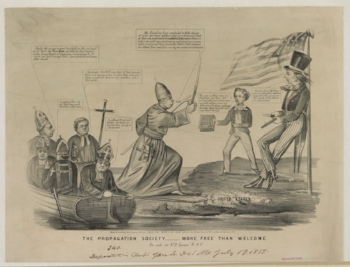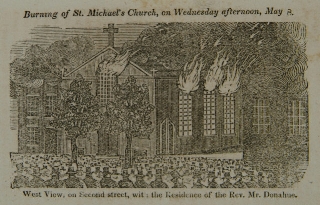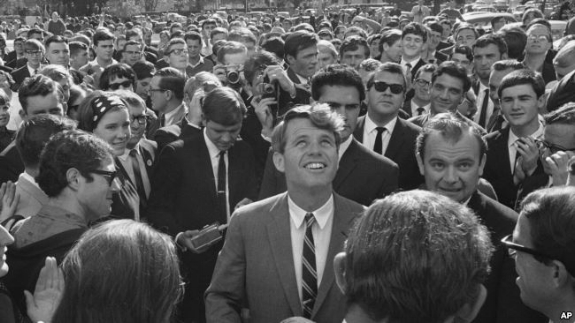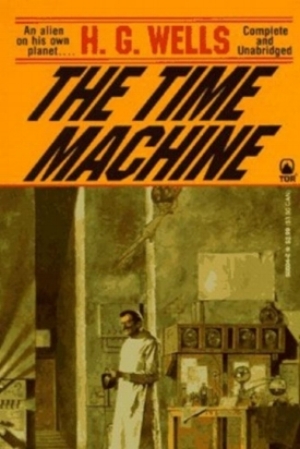Every Scandal Needs a Name
Even the most amateur, armchair historian knows that American history is dotted and spotted with presidential scandals. Some have been more luridly entertaining than crucial; others far more politically critical than mere wheezes. The most entertaining have aged so poorly as to be no more than minuscule asterisk points in the nation’s political history. Others have been so utterly critical as to threaten the nation’s very future as a representative democracy. Among the former - the relatively entertaining - are President Andrew Jackson’s marriage to Rachel Donelson (1828) and President Grover Cleveland’s affair with a widow named Maria C. Halpin (1884).
The first involves Andrew Jackson (“Old Hickory”), the nation’s 7th president, who married one Rachel Donalson in 1791 - many, many years before he was elected president. Rachel had previously been married and believed that she was legally divorced. However, after marrying Jackson, Rachel found out this was not the case. Her first husband charged her with adultery. Jackson would have to wait until 1794 to legally marry Rachel. Even though this happened over 30 years previously, it was used against Jackson in the election of 1828. Jackson blamed Rachel's untimely death two months before he took office on these personal attacks against him and his wife. Years later, Jackson would also be the protagonist of one of the most notorious presidential meltdowns in history.
The second involves Grover Cleveland, the nation’s 24th POTUS. Cleveland, the Governor of New York, had to deal head on with a scandal while he was running for president in 1884. It was revealed that he had previously had an affair with a widow named Maria C. Halpin who had given birth to a son. She claimed that Cleveland was the father and named him Oscar Folsom Cleveland. Cleveland agreed to pay child support and then paid to put the child in an orphanage when Halpin was no longer fit to raise him. This issue was brought forth during his 1884 campaign and became a chant "Ma, Ma, where's my Pa? Gone to the White House, ha, ha, ha!" However, Cleveland was honest about the entire affair which helped rather than hurt him, and he won the election.
Then there are the critical scandals which tore at the fabric of American politics. The first was the 1872 Grant-era Credit Mobilier Scandal. When it was was found that a company called Credit Moblier was stealing from the Union Pacific Railroad, they tried to cover this up by selling stock in their company at a large discount to government officials and members of Congress, including President U.S. Grant’s Vice President Schuyler Colfax. When this was discovered, it hurt many reputations including that of the Vice President.
Also pertaining to General/President Grant was the so-called “Whiskey Ring Scandal. ” In 1875, it was revealed that many government employees were pocketing whiskey taxes. President Grant called for swift punishment but caused further scandal when he moved to protect his personal secretary, Orville E. Babcock, who had been implicated in the affair. Grant went so far as to appoint former Missouri Senator John B. Henderson as America’s first Special Prosecutor. In this position, Henderson came close to bringing down the entire Grant Administration. Grant would leave the White House in disgrace, a sick, financially bankrupt man who would become utterly dependent on Mark Twain and the firm Merrill Lynch (which provided him a sizable advance on his autobiography) to bring him out of financial peril. Grant died in 1885, about 8 years after leaving the White House. It would take decades before his reputation would begin undergoing to long, painful trek towards rehabilitation.
Nearly a half-century after the Whiskey Ring, the rapacious Harding administration became embroiled in a scandal named after a Wyoming oil reserve: Teapot Dome. This would turn out to be the worst of the many illegal activities occurring during the short-lived administration of Warren Gamliel Harding, generally accepted by historians as being one of the worst presidents in American history. (Included in the list of failure are the likes of Andrew Johnson, Herbert Hoover, Franklin Pierce, William Henry Harrison and James Buchanan.) In the Teapot Dome scandal, Albert Fall, Harding's Secretary of the Interior, sold the right to the oil reserves in Teapot Dome, Wyoming, and other locations in exchange for personal profit and cattle. He was eventually caught, convicted and sentenced to jail. “Teapot Dome” also included poker-playing politicians, illegal liquor sales, a murder-suicide, a womanizing president and a bagful of bribery cash delivered on the sly. Before the scandal reached the Oval Office, Harding had died. While the official cause of death was listed as myocardial infarction (heart attack), many believe Harding was poisoned by his wife Florence (known as “The Duchess”) so as to spare her husband’s already tarnished reputation.
Fifty tears after Teapot Dome, a new suffix entered our political vocabulary: “GATE.” This, of course, was due to the daedal (cleverly intricate) Nixon-era power grab named after a Washington, D.C. hotel: the Watergate. For those who are either too young or willfully forgetful, Watergate began with the June 1972 break-in at the Democratic National Committee headquarters, which led to an investigation that ultimately revealed multiple abuses of power by the Nixon administration. As the investigation into this and the break-in at Daniel Ellsberg's psychiatrist's office (Ellsberg had published the secret Pentagon Papers) developed, Richard Nixon and his advisors worked to cover-up the crimes. Then came the “Saturday Night Massacre.” In an unprecedented show of executive power, the president ordered Attorney General Elliot Richardson and Deputy Attorney General William Ruckelshaus to fire Archibald Cox, a Harvard Law professor who was the special prosecutor. Both Richardson and Ruckelshaus refused Nixon’s order, and resigned their posts in protest. The role of attorney general then fell to Solicitor General Robert Bork, who reluctantly complied with Nixon’s request and dismissed Cox. Less than a half hour later, the White House dispatched FBI agents to close off the offices of the Special Prosecutor, Attorney General and Deputy Attorney General. This led to upwards of 50,000 people wiring both Congress and the White House, demanding that Nixon either be impeached or resign. Nixon, enough of a political realist to understand that he would like be impeached by Congress, resigned instead on August 9, 1974.
Over the next quarter century, there would be two additional scandals: Iran-Contra during Ronald Reagan’s second term in which Senior administration officials secretly facilitated the sale of arms to Iran, which was the subject of an arms embargo. The administration hoped to use the proceeds of the arms sale to fund the Contras in Nicaragua. Under terms of the Boland Amendment, further funding of the Contras by the government had been prohibited by Congress. After many hearings, President Reagan told the American people: A few months ago I told the American people I did not trade arms for hostages. My heart and my best intentions still tell me that's true, but the facts and the evidence tell me it is not.
The other kerfuffle involved President Bill Clinton, who was actually impeached for lying about an extra-marital sexual encounter with a White House intern named Monica Lewinsky. The scandal is sometimes referred to as "Monicagate," "Lewinskygate," "Tailgate," "Sexgate," and "Zippergate." The House approved two articles of impeachment against him: perjury and obstruction of justice. After a five-week trial, the Senate acquitted him, and fulfilled the rest of his second term. Despite having been impeached, Clinton successfully completed his second term; at the time he left the White House in January 2000, his national approval ratings were strong.
And now, nearly two decades after Monicagate, the nation finds itself waist-deep in the horrifically Byzantine sins of Donald Trump, his personal businesses, his family, his political entourage and a thousand-and-one other entities. To date, several of his closest associates have been tried, convicted and sentenced of crimes ranging from tax evasion to obstruction of justice. His business connections with the Russians and Saudis have been called into question, as have those of many members of his Cabinet, as the nation - and indeed, much of the world - anxiously awaits the final report of the (Robert) Mueller investigation. As a result of his “crisis-a-day” mentality and inability to get through 24 hours without Tweeting a fistful of lies, he finds his national approval rating to be the lowest of any president prior to his first mid-term election. And despite proclaiming that the 2018 midterms were a “tremendous success” because “we won the Senate” (conveniently forgetting that it was already controlled by the Republicans before the election), he now faces the prospect of a strongly Democratic House coming down with a lethal case of subpoena envy. The three main investigative committees in the House - Permanent Select Committee on Intelligence, Judiciary and Oversight and Government Reform - will now be chaired by, respectively, Adam Schiff, Jerry Nadler and Elijah Cummings - three seasoned pros who can be trusted to undertake investigations without partisan predetermination. Just the thought of these three august gentlemen wielding gavels should give the president sleepless nights . . . that is, if he ever sleeps.
Every scandal in American history has, we have seen, a one- or two-word nickname that easily summarizes what the scandal was about. It is next to impossible to imagine what name or nickname history will give to all the malfeasance, misfeasance, misdoing, misconduct and downright misbehavior which has been coming out of this current White House. Perhaps just The Trump Administration?
Anyone got a suggestion? If you do, please share . . .
688 days until the next election,
Copyright© 2018 Kurt F. Stone















